- Whether people are overall more cyber aware - and where their cybersecurity habits fall short
- The disconnect between cyber awareness and implementation of good cybersecurity practices
- Why tech savvy doesn't mean more secure
- The pros and cons of how different generations approach cybersecurity
- Strategies to move past awareness and towards action

Did you know the digital economy now accounts for more than 10% of the US GDP?
The trillions of dollars flowing through electronic transactions represent all the ways we work, learn, socialize, and shop online. We practically live online, meaning we need strong digital security more than ever.
Given our proximity to and reliance upon technology in everyday life, some cybersecurity awareness inevitably filters down to the general public. In fact, according to our latest report, 65% of people say they've had some cybersecurity education.
But what exactly does that cyber awareness look like in 2022? And for the average person, does awareness translate to meaningful action? What motivates people to change their online habits, and how can you hack your psychology to improve your own cybersecurity?
In our new 2022 Psychology of Passwords, we explore what people think they know about cybersecurity and what that means for how they choose to protect themselves online. For the first time in this annual report, we also analyze how people learn about cybersecurity topics and the generational differences in approaching digital security.
In last year's report, we saw how the Covid pandemic played a huge role in shifting people's online habits. It also revealed how cybersecurity habits are largely driven by emotions like fear and comfort.
So what's changed? Jump into our new report to learn:

